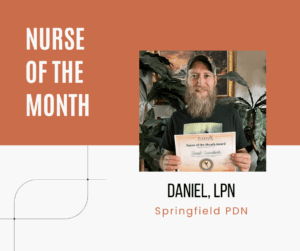3 Easy Suggestions that You or a Private Duty Caregiver Can Try
As winter gives way to spring, there are many new opportunities to support your loved one’s physical and emotional health. Winter may have kept you and your loved one indoors longer than you liked, and it’s time to try something new now that the weather’s warmer and there’s more daylight to enjoy.
Although the following tips can be used by family caregivers, you may not have time to consistently care for your loved one. Many families understandably struggle with their many other commitments and responsibilities outside of caregiving.
For families who need caregiver support, a compassionate private duty caregiver near you can try these strategies when taking care of your loved one this spring.
You or a Private Duty Caregiver Can Take Your Loved One Outdoors
If your loved one hasn’t been advised against leaving the home because of their condition, getting fresh air has several well-documented health benefits.
The National Alliance on Mental Illness California cites the mental health benefits of being outdoors, including better sleep and reduced stress. The T.H. Chan School of Public Health at Harvard adds improved cognitive performance to the list.
If your loved one is able to get light exercise, the benefits expand beyond mental health. Exercise helps with mobility and strengthens muscles. Walking an additional 500 steps a day has been shown to decrease the risk for heart disease, stroke, and heart failure.
Take your loved one for a safe, steady walk or push them in a wheelchair. You can also have your loved one’s private duty caregiver schedule this into the time they spend together. For some aging adults, simply sitting outside may be the best choice and will still benefit their well-being.
Increasing Hydration: What You or a Private Duty Caregiver Can Do
When the weather gets warmer, it is important that aging adults increase their water intake. Older adults are at risk of serious complications due to dehydration, so it’s essential to ensure that your loved one remains vigilant about their eight glasses of water a day.
However, it can be difficult to encourage an older adult to drink enough water, especially if their food intake or thirst has declined. In this case, try serving soup or milk with meals, as well as water-heavy fruits and vegetables, including watermelon and cucumbers.
You or your loved one’s caregiver can also establish a routine to make hydrating drinks and foods a part of their routine, such as serving snacks regularly or keeping an eye on fluid intake throughout the day. Your loved one’s caregiver can also plan meals and shop for groceries, providing another opportunity to get hydrating and nourishing foods into breakfast, lunch, and dinner.
Manage Seasonal Allergies
If you’re a family caregiver, you’re likely not a stranger to monitoring your loved one’s condition and giving medication reminders. If your loved one has seasonal allergies that act up in the spring, you want to be smart about addressing your loved one’s symptoms.
Seasonal allergies have the potential to affect your loved one’s health in two main ways. First, congestion symptoms can aggravate your loved one’s other conditions, such as heart or lung disease. Second, allergy medicines, including over-the-counter remedies, can sometimes interact with other medications your loved one might be taking. Alone, they can also cause side effects, such as drowsiness or dizziness, which should always be monitored in aging adults to prevent injuries and illness.
To protect your loved one from the symptoms of seasonal allergies, check with their doctor to get a safe allergy treatment. You or a private duty caregiver can provide reminders to your loved one, so they take this remedy on schedule.
On heavy pollen days, be sure to close doors and windows to prevent pollen from entering your loved one’s living spaces. You can even track pollen counts on your local weather website to learn when your loved one is most at risk of allergy symptoms. Vacuuming consistently and changing your loved one’s HVAC air filter every 30 days will also help.
A Private Duty Caregiver Can Help Establish Your Loved One’s Spring Routine
Developing a routine and schedule for your loved one is an important part of caregiving. Routine provides structure and events to look forward to. Each of the suggestions above are most effective when they are implemented into a regular routine during the spring.
However, family caregivers may struggle to provide that structure on a daily basis. This is where private duty care can make a difference. Private caregivers can offer housekeeping, meal preparation, companionship, help with hygiene, and many other tasks of daily living, as well as take advantage of spring weather.
You can schedule a private duty caregiver in multi-hour shifts, from two hours to 24/7 care, to ensure your loved one stays as safe and healthy as possible, no matter the time of year.
Find out more about all that private duty care entails.






